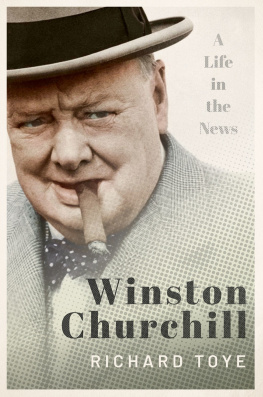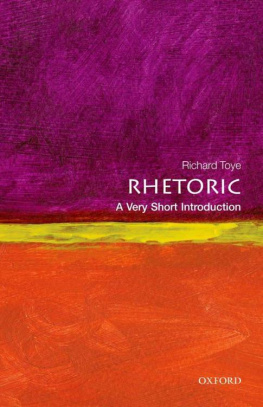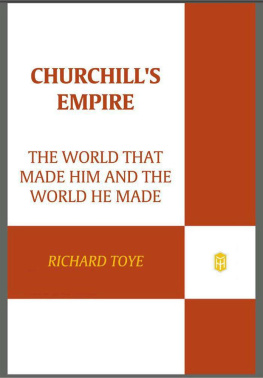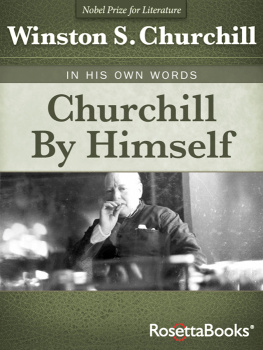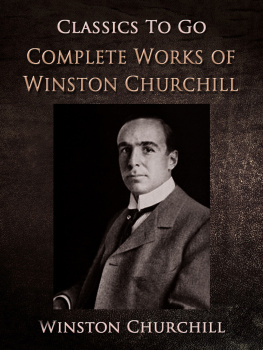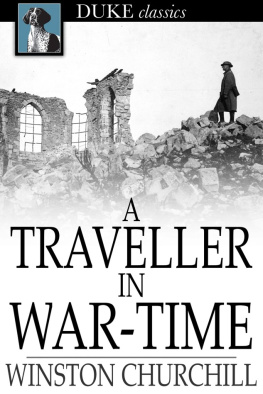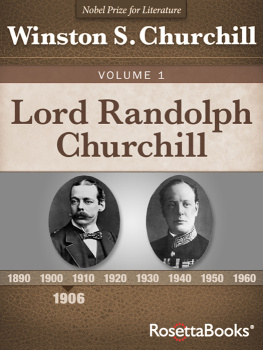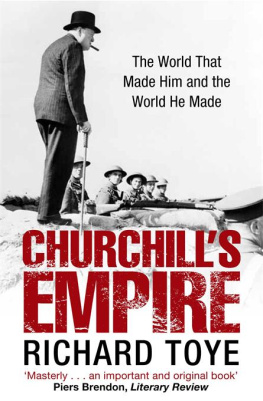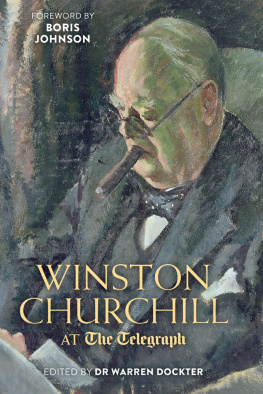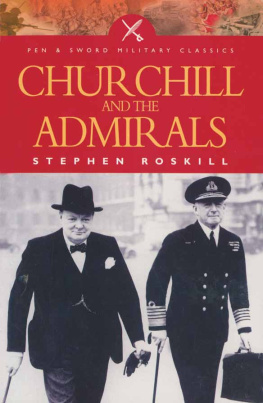Richard Toye - Winston Churchill: A life in the News
Here you can read online Richard Toye - Winston Churchill: A life in the News full text of the book (entire story) in english for free. Download pdf and epub, get meaning, cover and reviews about this ebook. year: 2020, publisher: OUP Oxford, genre: Art. Description of the work, (preface) as well as reviews are available. Best literature library LitArk.com created for fans of good reading and offers a wide selection of genres:
Romance novel
Science fiction
Adventure
Detective
Science
History
Home and family
Prose
Art
Politics
Computer
Non-fiction
Religion
Business
Children
Humor
Choose a favorite category and find really read worthwhile books. Enjoy immersion in the world of imagination, feel the emotions of the characters or learn something new for yourself, make an fascinating discovery.
- Book:Winston Churchill: A life in the News
- Author:
- Publisher:OUP Oxford
- Genre:
- Year:2020
- Rating:5 / 5
- Favourites:Add to favourites
- Your mark:
- 100
- 1
- 2
- 3
- 4
- 5
Winston Churchill: A life in the News: summary, description and annotation
We offer to read an annotation, description, summary or preface (depends on what the author of the book "Winston Churchill: A life in the News" wrote himself). If you haven't found the necessary information about the book — write in the comments, we will try to find it.
Winston Churchill: A life in the News — read online for free the complete book (whole text) full work
Below is the text of the book, divided by pages. System saving the place of the last page read, allows you to conveniently read the book "Winston Churchill: A life in the News" online for free, without having to search again every time where you left off. Put a bookmark, and you can go to the page where you finished reading at any time.
Font size:
Interval:
Bookmark:


Great Clarendon Street, Oxford, ox 2 6 dp , United Kingdom
Oxford University Press is a department of the University of Oxford. It furthers the Universitys objective of excellence in research, scholarship, and education by publishing worldwide. Oxford is a registered trade mark of Oxford University Press in the UK and in certain other countries
Richard Toye 2020
Reproduced with permission of Curtis Brown Group Ltd, London on behalf of The Trustees of the Mass Observation Archive
The Trustees of the Mass Observation Archive
The moral rights of the author have been asserted
First Edition published in 2020
Impression: 1
All rights reserved. No part of this publication may be reproduced, stored in a retrieval system, or transmitted, in any form or by any means, without the prior permission in writing of Oxford University Press, or as expressly permitted by law, by licence or under terms agreed with the appropriate reprographics rights organization. Enquiries concerning reproduction outside the scope of the above should be sent to the Rights Department, Oxford University Press, at the address above
You must not circulate this work in any other form and you must impose this same condition on any acquirer
Published in the United States of America by Oxford University Press
198 Madison Avenue, New York, NY 10016, United States of America
British Library Cataloguing in Publication Data
Data available
Library of Congress Control Number: 2019947977
ISBN 9780198803980
ebook ISBN 9780192526038
Printed and bound in Great Britain by Clays Ltd, Elcograf S.p.A.
Links to third party websites are provided by Oxford in good faith and for information only. Oxford disclaims any responsibility for the materials contained in any third party website referenced in this work.
No book is an island. It would not have been possible for me to complete this one had it not been for the help and support of a large number of individuals and organizations. I would like to thank all my colleagues at the University of Exeter. Gajendra Singh gave me helpful information about the Indian press. Nick Terry was an excellent source of advice on the German media. Andrew David generously helped me by tracking down material at the Howard Gotlieb Center. Many other peopletoo many to record in detailgave me useful hints and suggestions. Arddun Hedydd Arwyn kindly provided a translation from Welsh.
I conceived and wrote the book in parallel with teaching a new third-year module on News, Media, and Communication. I initially taught it with Sara Barker, who has since moved to the University of Leeds, and latterly with Freyja Cox-Jensen and Helen Birkett. All three have helped me learn much about news in the centuries prior to Churchills birth and this has encouraged me to think more deeply about issues such as rumour and celebrity. The students who have taken the course have also been a source of inspiration.
For valuable discussions on issues related to the book I would like to thank Warren Dockter, Gary Love, Julie Gottlieb, Steven Fielding, Daniel Hucker, and Bill Schwarz. Allen Packwood and his staff at the Churchill Archives Centre were amazingly helpful too.
My literary agent, Natasha Fairweather, has been as wonderful as ever. At Oxford University Press, Matthew Cotton believed in the project from the beginning and helped guide it through to completion. Kizzy Taylor-Richelieu also provided invaluable help, coordinating on issues such as cover design and permissions. Rosanna van den Bogaerde helped with permissions too. Howard Emmens was a superb copy-editor. Sathiyavani Krishnamoorthy did an equally excellent job at the proof stage.
Richard Batten, with his customary meticulousness, made the index.
Quotations reproduced from the speeches, works and writings of Winston S. Churchill are reproduced with permission of Curtis Brown, London on behalf of The Estate of Winston S. Churchill The Estate of Winston S. Churchill. Mass-Observation material is reproduced with permission of the Curtis Brown Group Ltd, London on behalf of The Trustees of the Mass Observation Archive The Trustees of the Mass Observation Archive.
My parents, John and Janet Toye, always take a great interest in my work and I always benefit from their comments and suggestions.
Kristine Vaaler has been unfailingly kind and supportive, as with every other book I have written. It is to her and our sons Sven and Tristan that I dedicate this book.
Witikon, Zrich,
October 2019
On 4 June 1929, a photograph of Winston Churchill appeared on the back page of the Daily Herald. It showed him outside 11 Downing Street, the Chancellor of the Exchequers residence which he had not yet vacated following the defeat of the Conservative government at a general election a few days earlier. The picture showed Churchill carrying a book with the one-word titleWARclearly visible. The caption to the photograph suggested that war was one of his favourite subjects. But was the photograph genuine? Churchill angrily concluded that it was not, after a member of the public wrote to him comparing the Heralds shot with a similar one that appeared in another paper; in this version the word WAR could not be seen. On Churchills instructions, Edward Marsh, his friend and private secretary, wrote to the Heralds editor, William Mellor, in outraged terms. Obviously your photographer, or someone at your office, has deliberately faked or forged a copy of the photograph which was published in the Daily Herald for the purpose of sustaining a prejudicial caption, he claimed.
To understand why Churchill jumped to this conclusion, it helps to know of the bad blood that had long existed between him and the radical left-wing Herald. Ten years before, when he was Secretary of State for War and Air, it had passionately opposed his support for the White anti-Bolshevik forces in the Russian civil war. He, in turn, had issued orders that the War Office was no longer to facilitate the circulation of the paper to British troops in France and Germany, because it contained propaganda of an essentially disloyal and subversive character. Some copies that had already reached their destination may have been destroyed. The anti-war poet and former soldier Osbert Sitwell had been moved by this to pen the following lines:
The Daily Herald
Is unkind.
It has been horrid
About my nice new war.
I shall burn the Daily Herald .
Now, perhaps embittered by the Labour Partys success at the polls and his own loss of office, Churchill was seen by his enemies to be lashing out once more. The Herald, for its part, was absolutely sure of its ground, to the point of appealing as a referee to the organ that was its ideological polar opposite. This was the Morning Post, sometime defender of General Reginald Dyer (the Butcher of Amritsar) and former employer of Churchill himself as a young correspondent three decades earlier. The Posts experts examined the materials submitted to them and were unanimously agreed that they can find nothing in the negative to suggest that it is not perfectly genuine. The contact print from the negative and the enlargement from which the reproduction in the paper was made were also genuine and bore no trace of having been touched. Whereas in the printed version the word WAR had been made blacker and more distinct, this was merely an emphasis of definition such as is employed in every process room to make clear some point of special interest in a picture.
Font size:
Interval:
Bookmark:
Similar books «Winston Churchill: A life in the News»
Look at similar books to Winston Churchill: A life in the News. We have selected literature similar in name and meaning in the hope of providing readers with more options to find new, interesting, not yet read works.
Discussion, reviews of the book Winston Churchill: A life in the News and just readers' own opinions. Leave your comments, write what you think about the work, its meaning or the main characters. Specify what exactly you liked and what you didn't like, and why you think so.

